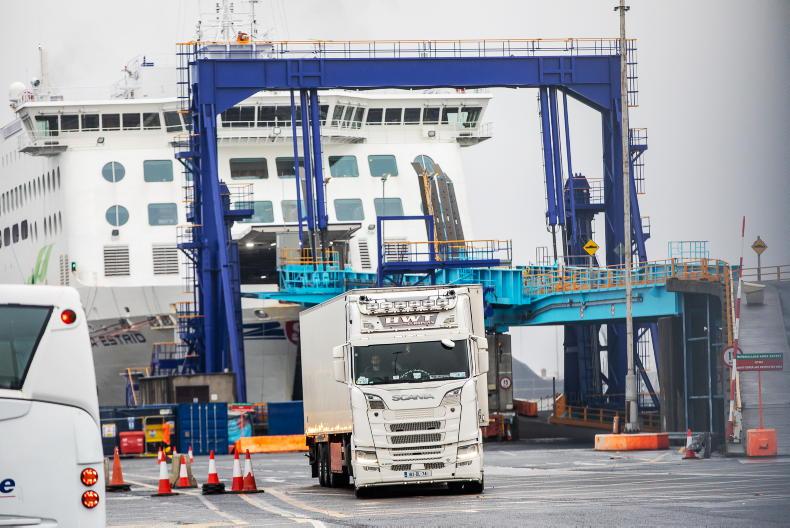There have been two weeks of trading between the EU and UK under the agreement reached on Christmas Eve that replaced UK membership of the single market and customs union.
So far, the only change that will be apparent to the vast majority of the population is gaps in supermarket shelves on both sides of the border, because the same rules apply for imports from Britain in both jurisdictions.
Farmers have experienced little direct impact from the changes on 1 January as prices for all commodities are at worst similar if not a little stronger.
Factory and haulage issue
Factories are at the coalface of the changes, having to prepare customs declarations and veterinary health certificates for sales to Britain and goods in transit through the UK to the rest of the EU.
Irish exporters have also so far had the benefit of Britain not enforcing full import controls as there is a six-month phasing-in period
This process is familiar to Irish exporting factories as it has always been required for trade with markets beyond the UK and EU. Also, because the Irish agri-food sector is so export-focused, the processing industry was well prepared in advance.
Irish exporters have also so far had the benefit of Britain not enforcing full import controls as there is a six-month phasing-in period.
It has been an entirely different experience for Irish importers and food exporters in Britain.
Britain is a relatively small exporter of produce from animal origin and with exports not having the same priority as the domestic market, little preparation had taken place ahead of 1 January.
There is also the fact that the EU moved to full implementation of post single market and customs union trading with immediate effect on 1 January
Part of their difficulty was that they weren’t given the new rules for doing business until hours before the new trading rules came into effect. There is also the fact that the EU moved to full implementation of post single market and customs union trading with immediate effect on 1 January.
Delays for trucks
The result has been delays in trucks regularly not being able to enter the ports as paperwork isn’t complete or waiting for ages when loading to get a vet to sign a health certificate.
It has been a nightmare for lorry drivers and the road haulage industry who had become accustomed to driving from Cork to Coventry with the same conditions as driving from Cork to Cavan. Now delays at ports and loading centres have become the new normal. In time we can expect exporters in Britain to become more familiar with what is needed to export to the EU and remove some of the delays.
However the other reality is that two weeks into the new arrangement, there is only a fraction of the normal traffic through the ports. This is because the start of January is the traditional quiet period and this year it was even more so because of stockpiling ahead of the UK leaving the single market and customs union on 1 January.
This suggests that while exporters will become more adept at completing the paperwork, the checking process will cause at least some level of friction in the ports of entry to the EU and from the middle of the year when entering the UK also.
While the EU and UK have a no-tariff, no-quota trade deal, that doesn’t cover every transaction involving both trade areas.
For example if a bulk consignment of New Zealand lamb lands in Britain, covered by the UK share of the import quota, and is split up with some shipped on to France or Ireland, it then becomes liable for the full EU tariff on sheepmeat.
Discussions are under way with Canada, US, Australia and New Zealand
This means Britain cannot continue to act as a clearing house for distribution of product across the EU and is particularly applicable to the island of Ireland.
The longer-term consequences of the UK no longer being part of the customs union and single market won’t be felt until the UK makes its own trade deals with other third countries. Discussions are under way with Canada, US, Australia and New Zealand.
This will make the UK market a very busy place for agri produce and Ireland, as the current main supplier of UK agri-food imports, will be put under real pressure.
So far, it is lorry drivers that have experienced the inconvenience of border controls being reintroduced, but in time it is inevitable that it will make consumer goods more expensive.
And as the UK market opens up to global imports, there is a real threat to value of the produce leaving Irish farms and sold in the British market as well.






 This is a subscriber-only article
This is a subscriber-only article











SHARING OPTIONS: